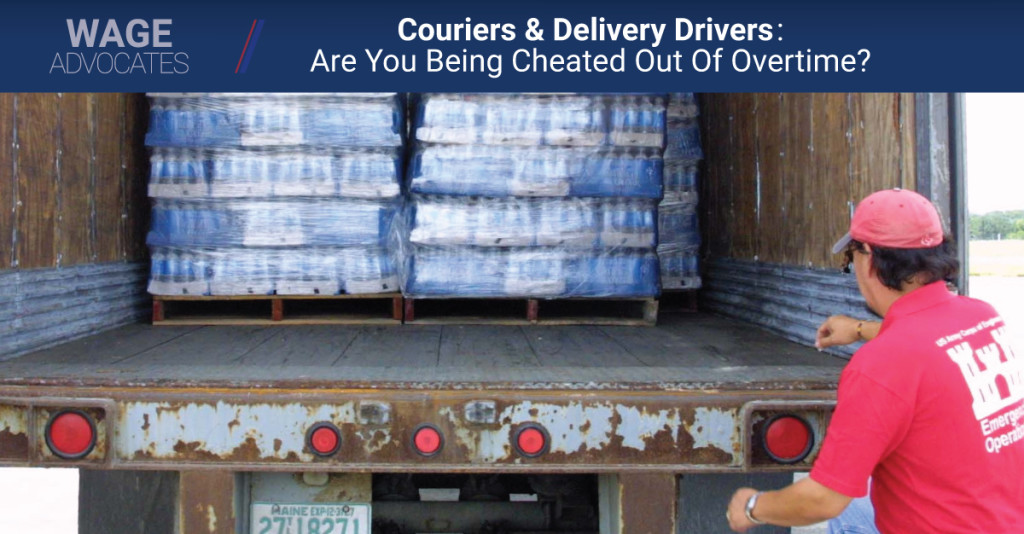Are You An “Employee”?
Employee misclassification is a shockingly common scheme, “one of the most serious problems facing [US] workers,” according to the Department of Labor.
Companies register their drivers as independent contractors, but go on to control nearly every aspect of their working lives, setting wages and hours. In most cases, that would make a driver an “employee,” not an independent contractor, under the Fair Labor Standards Act. But since employees are entitled to the minimum wage and overtime pay, along with fringe benefits and unemployment, many courier services would rather break federal law than pay their workers appropriately.

Every courier should get acquainted with the proper definitions of “employee” and “independent contractor” – the difference can cost you big. But that’s one of the biggest problems in this dispute: there’s no clear definition for either classification. “Independent contractor” isn’t a simple label, although numerous courier services use it like one – indiscriminately misclassifying employees to sneak around offering health benefits and avoid higher tax rates. It’s a relationship, and like every relationship, it gets complicated pretty quickly.
Businesses in this country are changing, outsourcing work that used to be performed by their own employees to third-party companies, who themselves rely on “independent contractors” to remain profitable. It’s a fundamental shift in how Americans work, and regulatory officials are struggling to keep up. In July 2015, the Department of Labor’s Wage & Hour Division released a new guide to clarify the distinction between independent contractors and employees.
In Administrator’s Interpretation 2015-1, the federal agency made an explicit break with the past. Employees used to be defined by “control” – the more “control” an employer exerted over a worker’s life, the more likely that worker was actually an employee, someone entitled to overtime and the minimum wage. We’re moving away from that narrow definition now, toward a concept known as “economic realities.” That means delivery people should pay more attention to how economically dependent they are on a courier service. Whether or not your employer sets working hours, or tells you how to do the work you’ve been assigned – those factors are less important.

Economic Dependence
Here are the 6 fundamental questions you need to ask about your employment relationship, as outlined by the US Supreme Court:
1. Is your work an integral part of the business?
What’s integral to a courier service? Delivering things to clients and customers. Obviously, couriers and delivery people are “integral” to that business model. A contractor painting the delivery company’s office probably wouldn’t be considered “integral,” since the company doesn’t make money based on what color it’s office is.
2. Could you lose out, or gain, based on “managerial skill?”
Do the decisions you make on the job affect how much money you ultimately make, or how much loss you sustain? This isn’t about how often you decide to work, or how many hours you pick up in a shift. That’s not “managerial skill,” it’s just being an employee. Deciding on the best route to take for a delivery, on the other hand, might exhibit “managerial skill,” but probably not.
3. Are you “invested” in the business?
Do you drive your own van, ride your own bike, or is the vehicle owned by the company you work for? Independent contractors make significant investments in their businesses, and incur the risk of loss through those investments. Riding your own bike probably isn’t enough, since these investments should “support a business as a business beyond any particular job.”
4. Does your work require “special skill and initiative”?
“Skill” in this question doesn’t mean how well you drive a van; it’s your business skills that matter here. Do you think of yourself as an independent business, and go out to find new clients?
5. Is your job relationship “permanent or indefinite?”
Independent contractors work a specific job, perform a specific function, then have to find a new employer. Employees, on the other hand, usually work for “indefinite” periods of time.
6. How much “control” does your employer have?
Control makes an appearance in the test, but it’s just one more factor to consider. Do you exercise control over “meaningful” aspects of the work you do or generally follow your employer’s directions?
Being an independent contractor is about being your own business owner, actively marketing your skills to gain new business and making important economic decisions to reduce costs and increase profits. Most workers in the US don’t fit the bill, and that includes most delivery people.
Thank you! I worked a long time without proper overtime pay and Wage Advocates helped me get compensation."Rating: 5.0 ★★★★★
